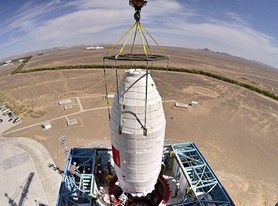据美国科技网站Gizmodo报道,新加坡研究团队最近开发了一款急速充电,续航能力超长的充电电池。
来自新加坡的研究团队最近研发出一种新型的锂离子电池,这种电池能在仅仅两分钟内迅速充电至70%。也就意味着它能在15分钟内将一台电车充满电,更强大的是它能续航时间超过20年。通常情况下,对新电池技术保持质疑态度是稳妥的,但是对这项突破不应仅仅充满期待。这项新电池技术并非史无前例,事实上它仅仅是根据现有的锂离子技术发展而来,纳米结构是此项新技术的关键。
它采用价格低廉的二氧化钛凝胶取代传统的石墨去生成锂离子电池的正极,这种材料同样应用于吸收紫外线的防晒霜。科学家们发现使纳米材料取代复合材料可以加速充电过程和运转速度。这项简单的创新使锂离子电池可以加快20倍的充电速度以及延长20倍的待机时间。
来自南洋理工大学的陈晓冬(音译)副教授在一次报道中谈到:“有了我们的纳米技术,仅靠五分钟的充电电车就能大大的提升他们的使用范围,这和目前汽车泵汽油的所需时间差不多。”可想而知这对智能手机的发展又有多大影响。
研究者表明在两年内他们会将此项新技术投入市场。尽管我们过去一直坚信快速充电电池前景可观,这种依靠大量现有技术的新型电池更让我们拭目以待。
附英文原文:
New Li-Ion Batteries Charge 70 Percent in 2 Minutes, Last for 20 Years
A team of researchers in Singapore have developed a next generation lithium-ion battery?that can recharge a battery to 70-percent in just two minutes. That means it would charge an entire electric car in just 15 minutes. And here's the kicker: it lasts over 20 years.
Normally, it's safe to be skeptical about new battery technology, but there's something rather hopeful about this breakthrough. The new battery isn't altogether new. It's actually just an improvement upon existing lithium-ion technology.
The key comes in the form of nanostructures. Instead of the traditional graphite used to create the lithium-ion battery's anode, this new technology uses a cheap titanium dioxide gel, the same kind of material used in sunscreen to absorb UV rays. The scientists found away to turn the compound into nanostructures that speed up the charging process. And speed it up they do. This simple innovation makes lithium-ion batteries charge 20-times faster and last 20-times longer.
"With our nanotechnology, electric cars would be able to increase their range dramatically with just five minutes of charging, which is on par with the time needed to pump petrol for current cars," Associate Professor Chen Xiaodong of Nanyang Technological University said in a release. Just imagine?what it could do for your smartphone.
The researchers say they'll have the new technology on the market in just two years. While we've certainly seen fast-charging battery promises in the past, the simple fact that this new battery uses so much existing technology is reason to believe that they're right about that timeline, too. [NTU]








